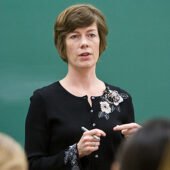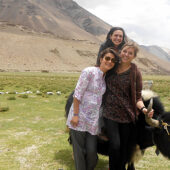Remembering Sudan
 Western amnesia encourages atrocity in Sudan, writes Political Science Professor Sarah Lischer in the Huffington Post, but the situation is not without hope. Lischer, an expert in humanitarian crises, military intervention, genocide and forced migration, studies the causes of these complex and controversial events, as well as the long-term consequences.
Western amnesia encourages atrocity in Sudan, writes Political Science Professor Sarah Lischer in the Huffington Post, but the situation is not without hope. Lischer, an expert in humanitarian crises, military intervention, genocide and forced migration, studies the causes of these complex and controversial events, as well as the long-term consequences.Categories: Global Wake Forest, Research & Discovery, University Announcements

 Losing weight and exercising more consistently top Americans’ New Year’s resolution lists. Health and Exercise Science chair Michael Berry says that adults who include their kids in fitness goals could make working out and losing weight a lot more fun.
Losing weight and exercising more consistently top Americans’ New Year’s resolution lists. Health and Exercise Science chair Michael Berry says that adults who include their kids in fitness goals could make working out and losing weight a lot more fun. Watching PGA tournaments, you might wonder how much the clubs used by pros ensure a successful season. Sports economist Todd McFall can help answer that question.
Watching PGA tournaments, you might wonder how much the clubs used by pros ensure a successful season. Sports economist Todd McFall can help answer that question.  For most of senior Meredith-Leigh Pleasants' young adult life, she was sure that she would follow the straight and narrow career path. But her journey took a right turn in the summer of 2011 after she spent three weeks in Zinkwazi, South Africa.
For most of senior Meredith-Leigh Pleasants' young adult life, she was sure that she would follow the straight and narrow career path. But her journey took a right turn in the summer of 2011 after she spent three weeks in Zinkwazi, South Africa. When making New Year’s resolutions this year, committing to a specific plan for when and where you are going to accomplish each goal will make you more likely to succeed, says assistant professor of psychology E.J. Masicampo.
When making New Year’s resolutions this year, committing to a specific plan for when and where you are going to accomplish each goal will make you more likely to succeed, says assistant professor of psychology E.J. Masicampo. After weeks of humming holiday songs, decorating the house with cheer and planning for a joyous celebration, the holiday season inevitably will come to an end. Assistant Professor of Psychology Christian Waugh studies human emotions and why some people are more resilient in maintaining positive emotions than others.
After weeks of humming holiday songs, decorating the house with cheer and planning for a joyous celebration, the holiday season inevitably will come to an end. Assistant Professor of Psychology Christian Waugh studies human emotions and why some people are more resilient in maintaining positive emotions than others. Though not yet definitive, identifying the Higgs boson particle would be on par with proving The Big Bang Theory, says Eric Carlson, a physics professor. While researchers in other fields might trumpet a breakthrough of this magnitude, the global physics community seems to have reacted with a combination of cautious optimism and muted excitement.
Though not yet definitive, identifying the Higgs boson particle would be on par with proving The Big Bang Theory, says Eric Carlson, a physics professor. While researchers in other fields might trumpet a breakthrough of this magnitude, the global physics community seems to have reacted with a combination of cautious optimism and muted excitement. A summer course in India brought together three students and inspired a second trip, rooted in discovering the road blocks to effective education. Read about the research conducted by the students, as well as their hopes for the future.
A summer course in India brought together three students and inspired a second trip, rooted in discovering the road blocks to effective education. Read about the research conducted by the students, as well as their hopes for the future. Will consumers purchase the same product online that is in a store if it can be bought for a cheaper price? Future retail marketers are looking for creative ways to tap mobile technology and build customer loyalty without discounting.
Will consumers purchase the same product online that is in a store if it can be bought for a cheaper price? Future retail marketers are looking for creative ways to tap mobile technology and build customer loyalty without discounting. An interactive replacement for the traditional college-level biology textbook called BioBook™, which was developed by an interdisciplinary team of faculty, allows students and instructors to tailor traditional course materials to their own learning styles.
An interactive replacement for the traditional college-level biology textbook called BioBook™, which was developed by an interdisciplinary team of faculty, allows students and instructors to tailor traditional course materials to their own learning styles.